Best Overall Winter Boot for Women
Baffin Chloe
Shaft Height: 10″ | Insulation: Comfort-Fit multilayer foam
REASONS TO BUY
Ultra warm
Thick and durable outsole
Impressive waterproofing
Great traction
Removable liner
REASONS TO AVOID
Heavy
Bulkier design
The Baffin Chloe takes top accolades this year thanks to an all-around impressive performance in each testing category. This is a sturdy and robust winter boot that demonstrates superb warmth, traction, coverage, and waterproofing. Baffin uses several insulating technologies, including a hollow fiber B-Tek Heat insulation and a polyester wool blend for warmth, while managing to stay breathable so your feet stay both warm and dry. The 10″ shaft and suede upper provide lots of coverage to keep snow and rain out of the interior. This boot took on everything from deep snow to puddles and lakes without crippling under cold, blizzardy conditions.
We found the Chloe to have a snug and stable fit with great grip, even when navigating slick slopes. The outsole and upper provide structure and support around the foot and ankle, providing confidence for outdoor pursuits. However, the design is bulky and heavier than some other models we tested. Overall, the Chloe impressed us with its versatility and superb performance across the board and is our top recommendation for those in need of ultra-warm, durable, and reliable boots for the coldest climates and deepest of winters. If you don’t love the look of this boot, the UGG Adirondack III is an ultra-warm boot that’s a bit more stylish, though you’ll pay more for the UGG branding.
Read more: Baffin Chloe review
Warming huts are nice, but with boots like the Baffin Chloe, you’ll likely spend less time trying to warm up, as these boots are an excellent choice for enjoying time out in the snow.
Credit: Briana Valorosi
Best Bang for the Buck
Kamik Momentum 3
Shaft Height: 10″ | Insulation: Synthetic Heat-MX Insulation
REASONS TO BUY
Great value
Easy slip-on design
Plush interior
Solid waterproofing
REASONS TO AVOID
Looser fit
Limited to casual use
The Kamik Momentum 3 is a treat for the feet! The Canadian brand nailed it in the comfort and warmth departments with a plush faux fur interior lining that feels like a heat box around the feet, particularly in colder winter temperatures. The bungee lacing system offers an easy entry, so you can quickly slip the boot on, cinch down the bungee, and head out to the door in seconds.
The outsole’s flat tread profile is underwhelming at first glance, but it felt grippy and reliable on most surfaces besides ice. The DWR-finished nylon upper sheds snow and water well, and the faux fur collar adds a barrier that further helps keep snow outside of the boot. While this isn’t the best choice for adventurous or active winter pursuits like snowshoeing, it satisfies most casual winter usage needs. At one of the lowest prices in the lineup, the Momentum gives an impressive level of performance at a fraction of the cost of other award winners. Another affordable boot that scored decently is the Columbia Minx Shorty III, but it’s not as warm as the Momentum.
Read more: Kamik Momentum 3 review
Deep snow is no challenge for the Kamik Momentum boots. Whether we wore them with pants tucked in, rolled up, or secured over the top, the Momentums kept our feet warm and dry while providing excellent traction.
Credit: Briana Valorosi
Best Protection for Wet Winters
Muck Boot Arctic Ice Tall AGAT – Women’s
Shaft Height: 17″ | Insulation: Fleece and neoprene
REASONS TO BUY
Tallest shaft in the lineup
Completely waterproof
Highly durable
Thick, sturdy sole
Amazing traction
REASONS TO AVOID
Heavy and bulky
Difficult to drive in
Limited versatility
The Muck Boot Arctic Ice Tall AGAT (Arctic Grip All Terrain) is our choice for the most protective, waterproof, multi-functional winter boot we’ve tested. The 17-inch shaft extends to just below the knee and is built with scuba-grade neoprene and fleece to keep your legs warm and dry in the coldest conditions. We love the rigid shaft that stands on its own, making stepping into and out of this boot quick and easy. The extra beefy sole adds additional insulation, while the firm yet pliable rubber composite underfoot sticks exceptionally well to the slipperiest surfaces. If you need an ultra-protective boot that can tackle the coldest and wettest days of winter, this workhorse is built to do exactly that.
The boot’s beefy construction makes for heavy footwear. The wide circumference of the shaft makes it easy to stuff your pant leg into the boot but leaves space for moisture to leak in when overly exposed. The cuff is also prone to chafing if you’re not wearing pants thick enough to protect your legs (particularly for shorter folks). Those minor things aside, the Arctic Ice Tall is an excellent buy if you’re seeking exceptional protection and durability in a work boot. If you’re looking for a boot for smaller storms or those in-between seasons, the Forsake Patch Mid performs reasonably well in the snow but offers a more casual look.
Read more: Muck Boot Arctic Ice Tall AGAT review
The Muck Boot is a big, burly neoprene boot, but we threw it on for a wide variety of occassions – from snowy dog walks to blizzard shoveling sessions to mucky off-road excursions.
Credit: Liz Chamberlain
Best for Winter Hiking
Keen Revel IV Polar – Women’s
Shaft Height: 7″ | Insulation: 200g Recycled Keen.Warm
REASONS TO BUY
Very warm and breathable
Exceptional stability and support
Roomy fit is great for thicker socks
REASONS TO AVOID
Hiking-specific style
Bulky materials
Stiff
The Keen Revel IV Polar is an exceptional winter hiker. We love its warm and durable construction, breathable materials, and waterproofness. This boot boasted some of the best traction and protection on icy trails and uneven ridgelines. It is compatible with microspikes, gaiters, or a set of snowshoes and is comfortable enough to wear on its own all day long. Enjoy this versatile hiking boot as you splash through the rain, muck, and snow during your snow-capped adventures.
While there is not much we disliked about this boot, it has an inherently ‘techy’ and outdoorsy design that isn’t the most fashionable option to wear with your average everyday outfit. The fit is wider in the forefoot, which is great for bulky socks but might be too wide for those with narrow feet. Regardless, if you work outdoors and winter is synonymous with outdoor adventure, this cold-weather hiking boot is highly dependable. If you prefer a sneaker-style winter boot that also dons some style, consider the Danner Inquire Mid Insulated.
Read more: Keen Revel IV Polar review
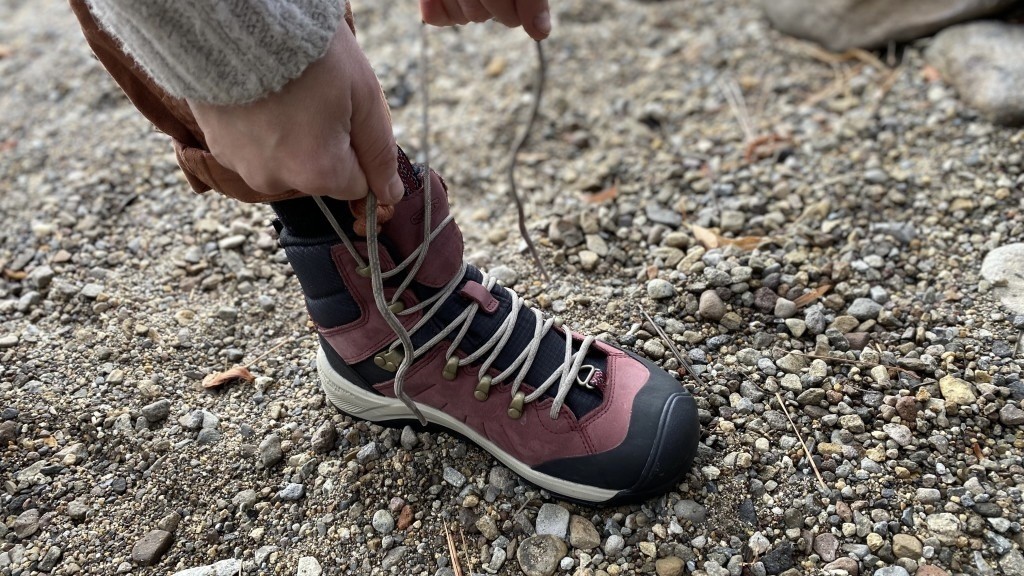
The Revel IV is a great winter hiker with some of the best traction in our test.
Credit: Liz Chamberlain
Best Lightweight Coverage
Baffin Escalate – Women’s
Shaft Height: 12″ | Insulation: Thermaplush, B-Tek Heat
REASONS TO BUY
Lightest boot in the review
Very warm
12″ of leg coverage
Bungee cinch lacing system
REASONS TO AVOID
Tough to get on and off
Minimal structure
Decent waterproofing
The Baffin Escalate may not be focused on style, but its functionality in the weight, warmth, and coverage departments is notably impressive. We love the full coverage design and Baffin’s B-Tek Heat insulation that kept us impressively warm in the coldest temperatures. Most importantly, this boot is light as a feather at just 10 ounces per boot for a US women’s size 7 and feels like a giant slipper with tread.
While the Escalate has many redeeming qualities, we didn’t love a few things about its design. It has a snug fit that may be too tight for wider feet or larger calves, and the construction lacks stability for more intense outdoor activities. The lack of structure in the upper also makes it difficult to get the boot on without sitting down. If you can get by some of these quirks, those who prioritize warmth and protection in ice-cold conditions will likely find the Escalate to fit their fancy. If you’re seeking an even taller boot, we also highly recommend the Muck Boot Arctic Ice Tall AGAT, which has better weather protection, traction, and durability.
Read more: Baffin Escalate review
We do qualitative tests on each boot’s materials to assess durability, strength, and structure. The Baffin Escalate is the most flexible, slipper-like boot in the winter boot category.
Credit: Cory Caldwell
Best Versatility
Forsake Patch Mid
Shaft Height: 6″ | Insulation: Wicking mesh
REASONS TO BUY
Four season versatility
Reliable traction with directional sole pattern
Breathable
Stylish
REASONS TO AVOID
Not ideal for deep snow or extreme cold
Soft leather upper doesn’t lend itself to a snug and secure fit
The Forsake Patch Mid is a versatile winter boot that dances between all four seasons with style. We love the modern aesthetic that pairs well with jeans and urban outings yet rates high across our metrics with an impressive performance in the snow, on the trail, and during our weather protection tests despite its urban look. It scored especially well in terms of comfort, ranking just short of the top-tier models.
Lined with HydroGuard™ waterproof membrane and a wicking mesh lining, the Patch Mid features an unconventional “insulation” system compared to our other winter boots. Rest assured, they are wildly capable of keeping feet warm and dry! Although they won’t perform as well in deep winter conditions as a Pac boot, they span across all four seasons with style and functionality. Active winter outings, urban commutes, and shoulder season hikes are all suitable for this one pair of boots. If you’re looking for a winter boot that looks more like a skate shoe, check out the Vans Standard Mid Snow MTE.
Read more: Forsake Patch review
In 30-40-degree (Fahrenheit) temperatures, we appreciated the fully waterproof membrane and the breathable mesh liner on the Patch, allowing our feet to regulate temperature and remain comfortable, mile after mile.
Credit: Briana Valorosi
Compare Products
Storm after storm, we sampled our test boots each morning as we shoveled our way to our snowblower and out of our driveway. The UGG Adirondack III was a sturdy yet flexible work partner throughout it all.
Credit: Liz Chamberlain
How We Test Women’s Winter Boots
Since 2013, we’ve tested over 100 unique winter boots for women and men. We research top brands and products and then put them to the test out in the field. Our testing process includes buying and using every pair of boots in our lineup. We’ve spent hundreds of hours in the snow and cold, playing, walking, and doing chores for a complete analysis. Testing includes slogging in cold water to check waterproofing and measuring internal air temperatures with the boots soaking in an ice bath to assess insulation. With testing grounds from Southwestern Colorado to Northern California to British Columbia, we provide our insight and recommendations to help you find exactly what you want. Our testing process was designed to ensure we didn’t miss any crucial details and spans five metrics and 15 individual tests for each boot:
- Warmth (25% of overall score weighting)
- Weather Protection (25% weighting)
- Comfort and Fit (20% weighting)
- Durability (15% weighting)
We forcibly rub the boots on tree bark, ice, pavement, and other rough surfaces that will test abrasion resistance.
Credit: Cory Caldwell
Why Trust GearLab
Liz Chamberlain, our current boot expert, is a winter enthusiast based in Truckee, CA. Liz is a downhill extraordinaire, seeking out the many mountain activities the Lake Tahoe area has to offer. Working in retail sales at Truckee’s finest bike and ski shops has taught her to take a design-focused lens when approaching gear assessment and sales. With a graduate certificate in sustainable innovation, Liz has a background in material sourcing and functional designs. You can trust her for all insights related to fashion and function.
Amber King, a Canadian native transplanted to southwestern Colorado. She works full-time as an outdoor educator, teaching students even when the cold of winter is rearing its ugly head. Together, they have spent over 200 hours testing winter boots, wearing them in everything from warm spring storms to tall snowdrifts in their hometowns out West.
Rounding out the Winter Boots review for Women, Briana Valorosi, has spent countless miles reviewing a range of women’s footwear in all seasons and conditions. Born and raised in the Sierra Nevada mountains, she spends extensive time hiking, biking, and pushing gear to the limits. Now located on the Western Slope of the Rocky Mountains, she explores mountains and deserts in pursuit of awe while hiking, biking, skiing, and scrambling.
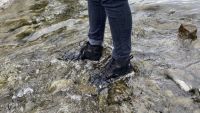
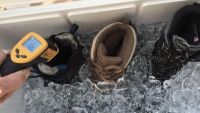

How To Choose the Best Women’s Winter Boots
When deciding on the right type of winter boot, there are a few factors to consider.
What’s Winter Like in Your Area?
Does it snow a lot where you live? How cold does it get? Does winter tend to be wet? These factors will have a bearing on the style of boot. For example, if you’ll be using your boots to frequently shovel a foot of snow out of your driveway (like our staff in Tahoe), you’ll want a boot with a tall shaft. If you plan to go on winter hikes, you’ll want a boot that laces down so your foot doesn’t slip around. If it’s quite cold in your area, choose a boot with robust insulation for warmth. Wet winter? Make sure the waterproofing is up to snuff.

A good winter boot is warm, comfortable, keeps your feet dry, and provides good traction.
Credit: Edward Kemper
How Much Warmth Do You Need?
Regarless of whether you just want a cute boot to wear around town in winter or need something serious and heavy duty for blizzards, we all want our winter boots to keep our feet warm. Most boots have some kind of synthetic fill, and many companies use their own proprietary insulation technologies. Some companies will list a temperature rating. Although there is no real standardization for this rating, it can help give you a ballpark idea of a boot’s intended climate. Beyond insulation, factors like fit, the shape of the toe box, and the seal at the top of the boot will influence warmth. Remember, a too-small boot can lead to poor circulation, which will make your feet colder. It’s best to size boots with enough room for thick winter socks, but not so big that your feet slide around inside them.
Waterproofing to Stay Dry
It’s likely that you’ll be moving through snow, slush, or rain in the winter, and you want your feet to stay dry. The outer on winter boots are typically made of rubber, nylon, or treated leather, and often have a Durable Water Repellent (DWR) coating to keep water from soaking through to the insulation. It’s also important to pay attention to shaft height. The taller the boot, the more leeway you have in deep snow or puddles. You can also get a boot with a removable liner, which will dry out more quickly if the boot gets saturated.
Finding a Boot with Good Traction
The traction of your boot is important if you’ll be navigating snow, ice, or using your boot for hiking. For slick surfaces, look for deep lug patterns on the outsole, which can help provide grip. (Sometimes on ice even the grippiest rubber or deepest lugs may not suffice. In this case, we turn to snow grips, which are spikes you attach to the bottom of your footwear.) Quality winter boots have softer rubber compounds that don’t harden in low temperatures, which helps them maintain grip. Our traction metric will help you discern which boots can keep you on your feet.
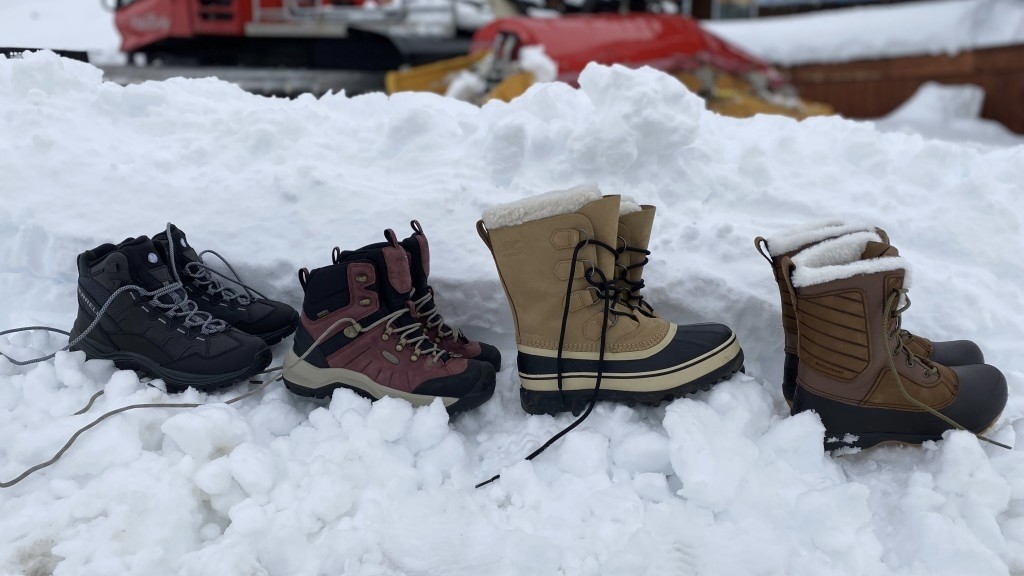
Our local ski resort was good grounds for testing traction and coverage after our first storm of the season.
Credit: Liz Chamberlain
Analysis and Test Results
Winter is a time to finally celebrate and immerse yourself in the cold fronts and deep dive into your favorite snowy activities. Our goal is to help you find the best boots to enjoy the winter season and brave the cold.
Value
A high-performing women’s winter boot doesn’t have to be ultra-expensive. We took the time to test products along the entire spectrum of price ranges to find out what works best. We do not review prices until after we have tested each boot. At that point, we apply our honest opinion of value based on the price and performance of each product. When considering value, be sure to do your research and find a boot that balances the performance you need with a price you can manage.
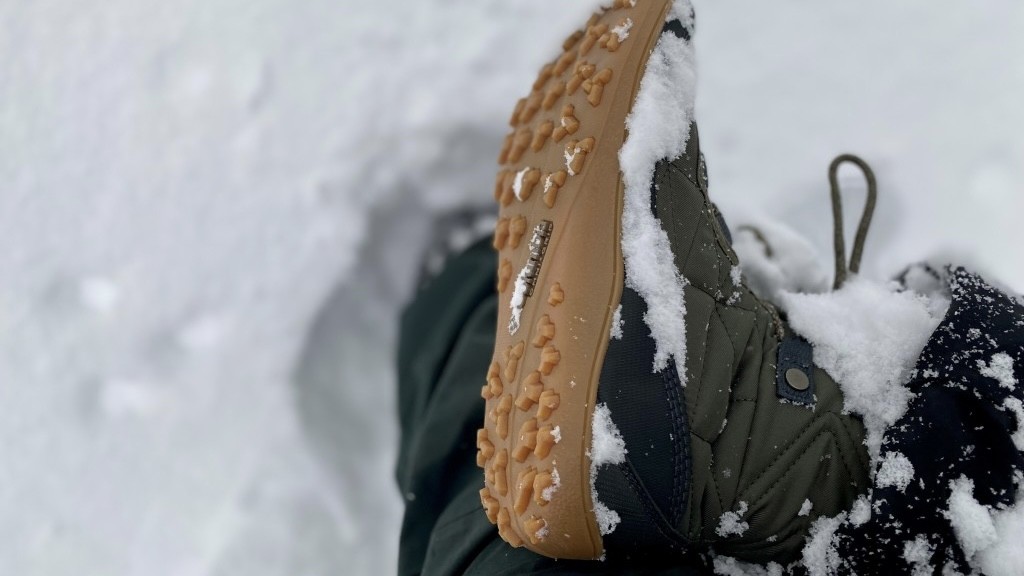
The Minx Shorty III performs well across the board at an affordable price.
Credit: Liz Chamberlain
Sitting on the lower end for price yet performing well across our tests, the Columbia Minx Shorty III is an excellent option for those focused on comfort and waterproofing. While the Minx Shorty III didn’t top the charts in any one category, it performed well across the board and is generally a solid one-quiver boot that won’t break the bank. That said, the Kamik Momentum 3 is hard to beat when it comes to value. Excellent warmth, waterproofing, and comfort with one of the lowest prices we’ve seen for a winter boot? Yes, please.
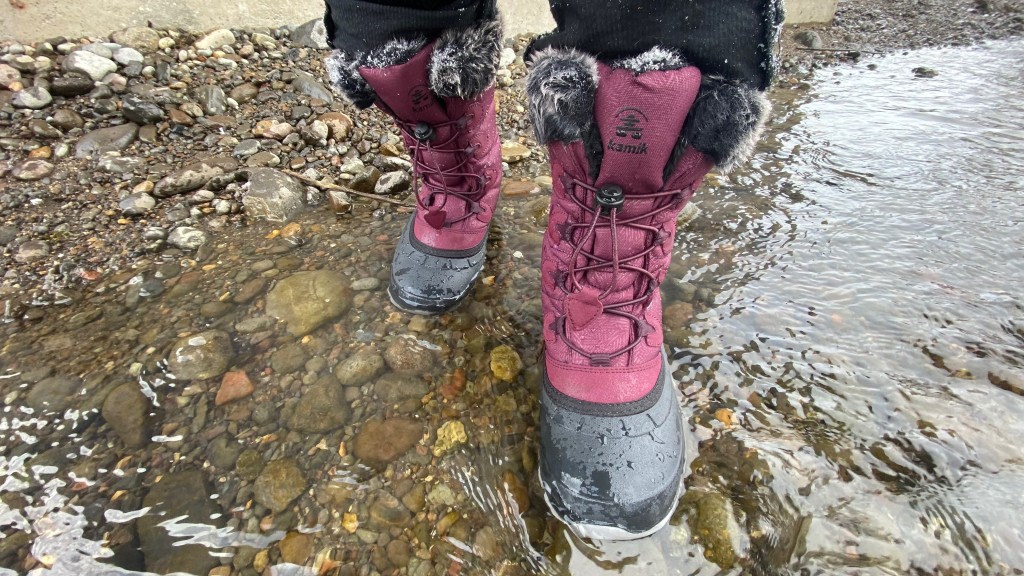
The Momentum 3 is a cozy, stylish, and high-value winter boot option.
Credit: Liz Chamberlain, Keeghan Sebahar
Warmth
Cold weather can be brutal. Trying to warm your feet back up after a cold day is a difficult task. We all need a boot that will facilitate good thermoregulation throughout the coldest days of winter. For this reason, warmth is one of the most highly weighted evaluation criteria in this review. Ideally, a winter boot should keep your feet warm, whether you’re simply standing around in the cold or actively hiking, snowshoeing, or traveling. A few key factors contribute to the overall warmth and highest ratings: the warmest options have thicker outsoles, taller shafts, and high-quality insulation. Your boot should also provide excellent breathability to vent moisture while you’re in motion; dry feet are warm feet. Another important piece of gear is a solid pair of winter socks that can insulate even if your feet get wet. Lean towards wool or synthetic fibers for the best warmth and moisture-wicking capabilities.
To objectively measure the insulation of all 50+ boots, we set each model into an ice bath and tracked how much their inside temperature dropped over 10 minutes.
We combined these measurements with a shaded snow bank test to expand the metrics of heat loss further. This helped us compare the relative amount of thermal insulation. We hiked in each pair and stood around in snowfields and snowbanks while sipping hot chocolate on cold nights, taking note of which boots kept our feet the warmest. We walked around town in frigid temperatures. We even stomped around in river water. Using a culmination of the test results, we determined which boots were constructed for arctic conditions and which should probably stick to the streets.
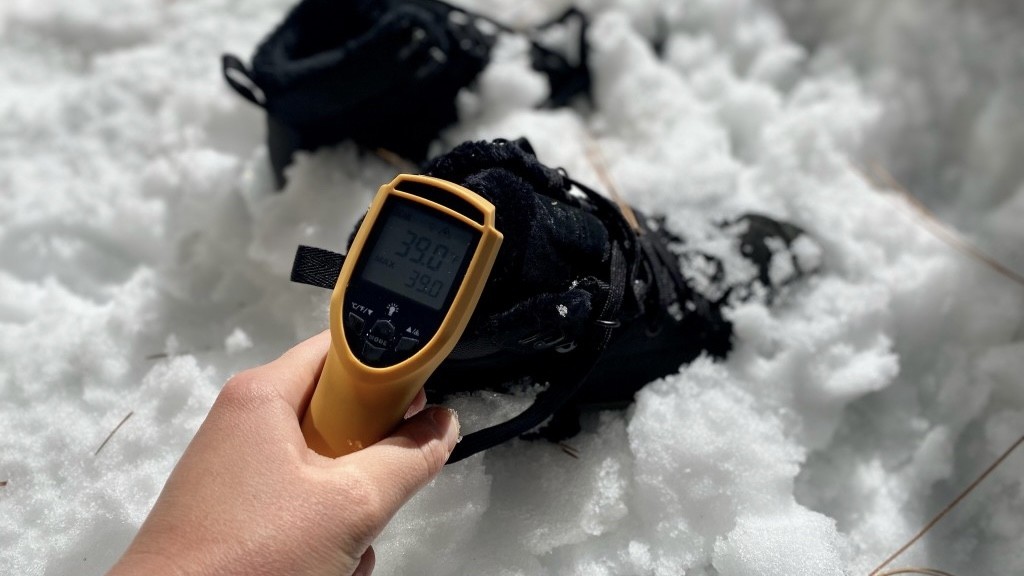
We used a short range infrared temperature gun to measure the internal temperature of the boots after a timed period packed in ice and snow. This helped us quantify the warmth retention capabilities of each one.
Credit: Liz Chamberlain
Many winter boots are rated to a specific temperature. While these numbers offer a potential point of comparison, it’s hard to take this estimate at face value. The warmth you experience will vary depending on the socks you wear, your metabolism and circulation, and your perception of the cold. We recommend taking these numbers with a grain of salt, but they should still be useful to figure out which boots will be warmer than others. More importantly, pay attention to the boot’s construction while you try to evaluate warmth.
The warmest boots we tested offer serious insulation underfoot and up the leg. The Baffin Chloe takes the top spot for this metric. This boot has a multi-layered insulation system with a Polywool blend that insulates internal temperatures and adds breathability and wind protection to the liner. The Chloe demonstrated the smallest internal temperature change after our snow bank and ice bath tests. The Baffin Escalate also performed very well in this metric, just behind the Chloe, despite its incredibly lightweight design. Baffin’s proprietary heating technologies deliver on their “tundra-rating” temperature claims for both of these boots.
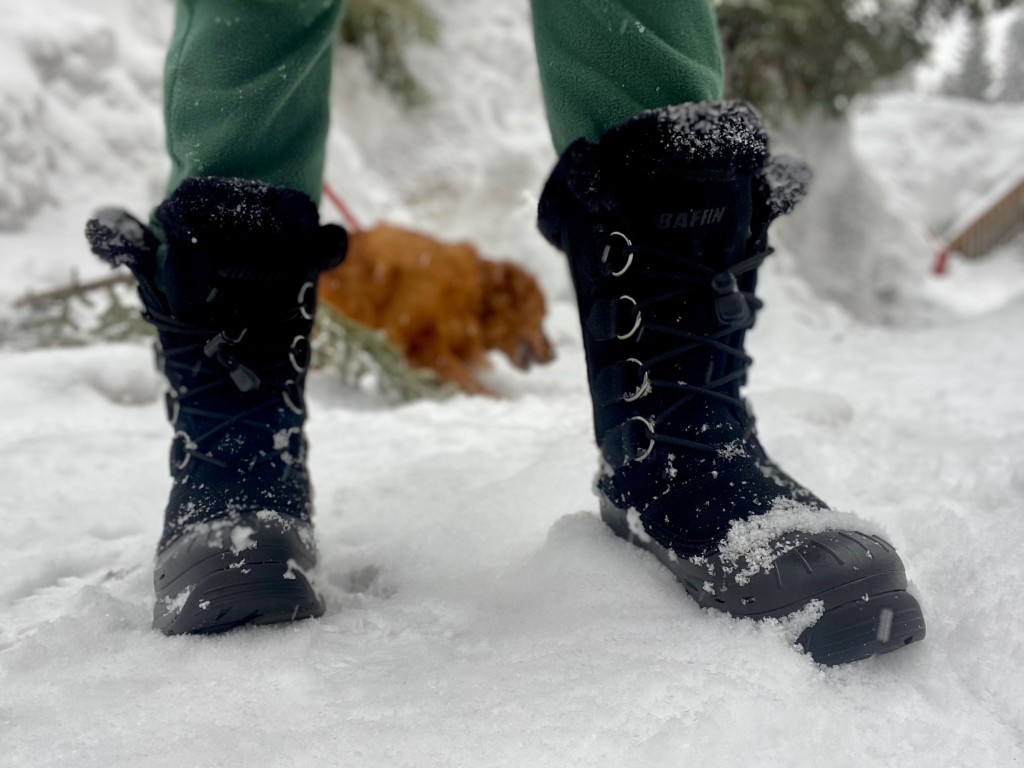
The Baffin Chloe kept us warm on snowy winter walks.
Credit: Liz Chamberlain
The Muck Boot Arctic Ice Tall is another prime example of a warm and protective boot. With the tallest height of any boot in our review, the 17-inch shaft insulates throughout and offers superior insulation on the sole, keeping our feet warm in single digits while supplying unbeatable protection. The Sorel Caribou has the thickest sole of all our tested models and is one of the warmest boots for standing around in the cold or enjoying activities like snowmobiling. It’s packed with 9mm of felt lining that doesn’t seem to compact or lose warmth, even after months of wear. This was one of our favorite boots to wear when shoveling the driveway on cold mornings. However, the Arctic Ice Tall is more protective when the snow is really deep, thanks to a tall shaft height that insulates the calf. For comparison, the Sorel Caribou is about 11 inches tall, 6 inches shorter than the Arctic Ice.
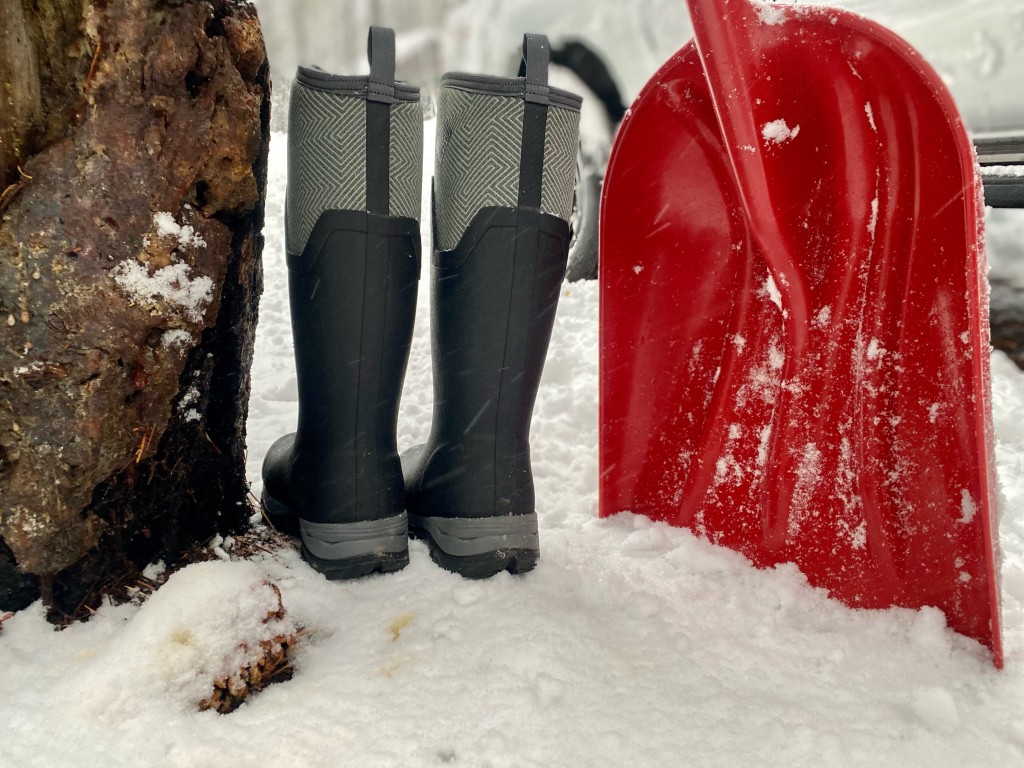
The Muck Arctic Ice Tall is a stellar option for those who need maximum coverage from deep, wet winters.
Credit: Liz Chamberlain
Boots with a faux fur protective collar offer extra protection and warmth from the snow because they help prevent snow from falling inside the boot shaft. From our perspective, the Columbia Minx Shorty III and The North Face Shellista IV Mid have the most stylish fur collars that blend nicely with the boot design. They also provide solid warmth despite having more shallow soles than burlier boot designs, though the Shellista is considerably warmer than the Minx.
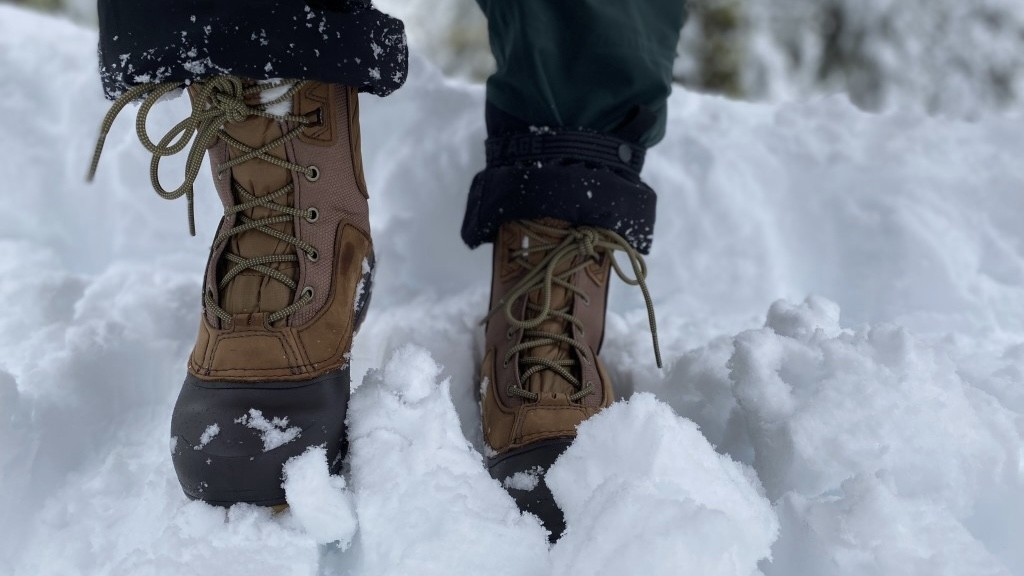
We found the Shellista to have no issues shedding wet snow.
Credit: Liz Chamberlain
Despite our praise for thick soles, many boots in the lineup have a thinner construction and still provide quality insulation. For example, the 10-inch shaft of the UGG Adirondack III is filled with lofty, warm sheep’s wool — an organic, natural fiber that offers fantastic breathability and overall warmth. The Kamik Momentum 3 has a pronounced faux fur lining and collar that adds warmth and weather protection, keeping snow from entering the inside of the boot. The sole isn’t as thick as the Sorel Caribou or Baffin Chloe, but shares similar material thickness to Shellista IV Mid.
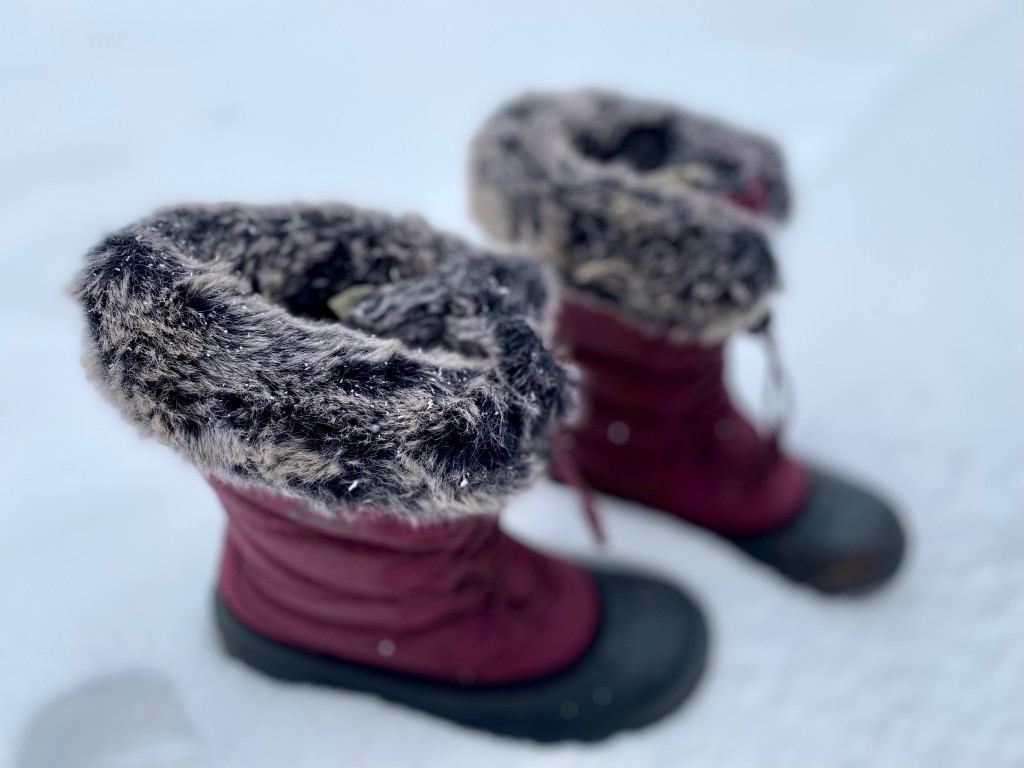
The fur collar on the Momentum 3 is bushy and lush, keeping the calves warm and snow from entering the interior of the boot.
Credit: Liz Chamberlain
Weather Protection
Winter can bring a fast-changing mix of snow, slush, and ice. With the proper footwear, your feet (and pants) can stay protected when you’re out in freezing weather. To test this, we hiked through slushy puddles, tall snowbanks, rivers, and streams, all the while evaluating the materials of each boot. Those that scored the highest had the least amount of snow and water intrusion and offered the best protection in adverse conditions.
We found that the most weatherproof boots are constructed of rubber, neoprene, and/or leather. Look for boots with taped seams that are double-stitched and reinforced to keep water out. Keep in mind that most products have a distinct flood level. Sometimes, a poorly sealed seam or the joint where the tongue meets the shaft. We tested and noted the flood level for each boot.
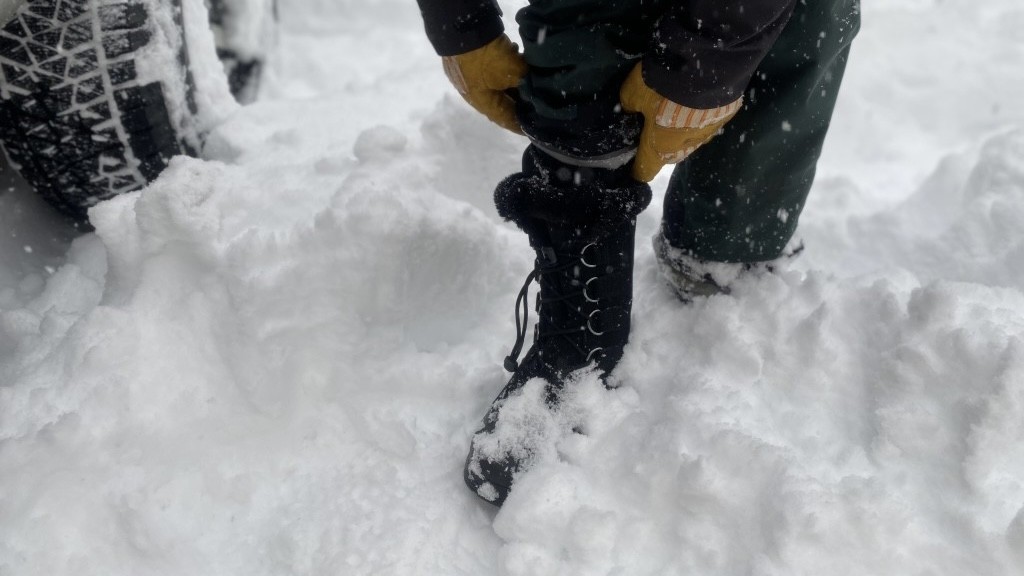
Even with their high shaft, the Baffin Chloe is a breeze to get into and tighten up.
Credit: Liz Chamberlain
Be sure to evaluate the type of material used in the upper to determine if it is truly waterproof. Some products in this review claim their materials are waterproof when they are actually only snow-proof at best. Additionally, any product made from leather probably needs to be treated with a snow sealant at least twice per season to maintain protection.
If water and snow protection is your priority, the Muck Boot Arctic Ice Tall is a clear favorite. Whether you’re blowing snow off your driveway, trudging through wet and soggy fields, or tackling tall snowbanks, this 17-inch boot is your best bet. It is the tallest and burliest option out there, backing its protection with 5mm of scuba-grade neoprene and rubber. It’s our favorite for protection because it’s easy to slip on and warm, and its flood level extends to the top of the boot thanks to no seams or laces. The Baffin Chloe has a notably tall shaft at 10 inches and is waterproof up to 9 inches. This boot performed like a rain boot when dunked into lake water and shed snow just as easily.
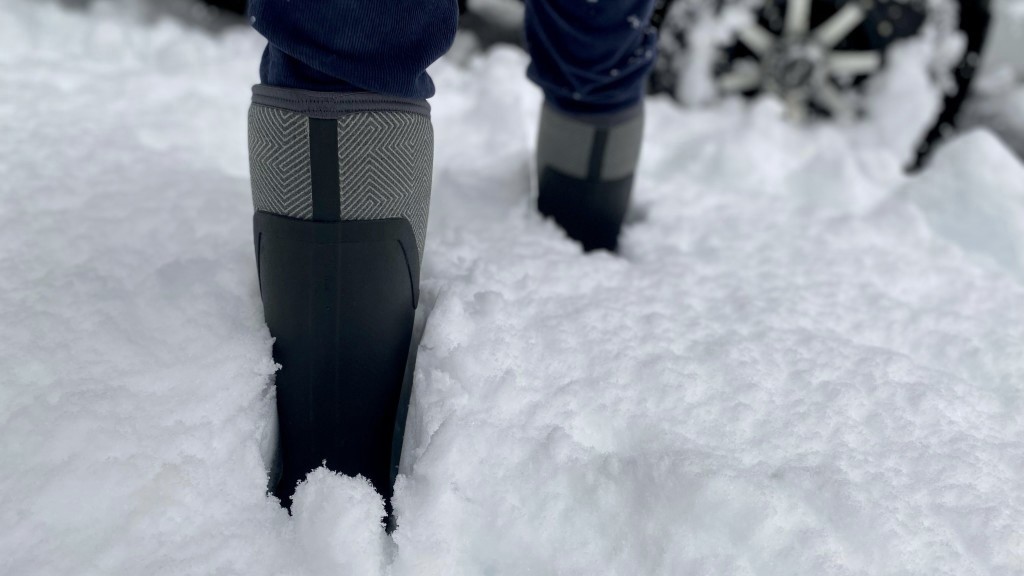
We loved the Arctic Ice for tasks like shoveling deep snow.
Credit: Liz Chamberlain
The Sorel Caribou features a removable liner and beefy insulation to keep your toes toasty in cold weather. The Caribou’s overlays ensure that it is waterproof nearly all the way to the boot’s collar, at about 10 inches. The Bogs Crandall II Tall Adjustable delivers 3mm of waterproof insulation with a shaft height of 13 inches. While the Crandall II was not a top scorer for this metric, it is a great option for those looking for a rainboot design that offers a bit of extra insulation.
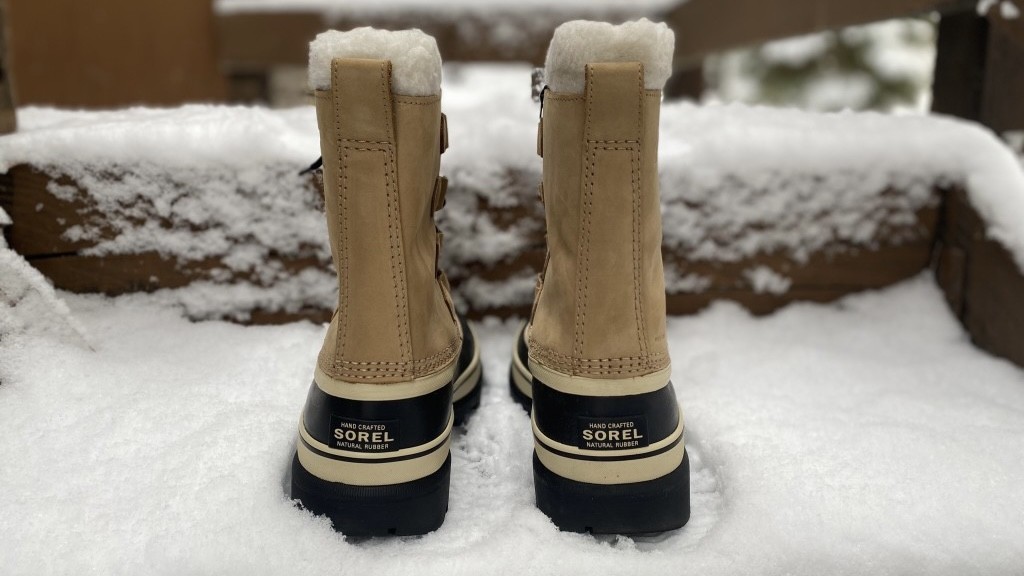
We assessed the shaft heigh, outsole materials, presence of a collar, and outsole lug patterns to evaluate factors like the level of protection, durability, and traction, that would determine versatility and application of the footwear.
Credit: Liz Chamberlain
If you’re searching for a highly weatherproof winter hiking boot, the Keen Revel IV Polar offers bomber weather protection. The Revel IV features leather overlays on the collar with a breathable waterproof membrane and deep tread on the sole. For a highly breathable hiking boot that offers HydroGuard weather protection, the Forsake Patch Mid is an excellent choice year-round. We were pleasantly surprised by the weatherproofing on both of these hikers. Unfortunately, both models are roughly ankle height, so the maximum coverage is only about 5 inches before your sock or pants become exposed to the elements. If you think you’ll be in water or snow deeper than that, we recommend grabbing some gaiters.
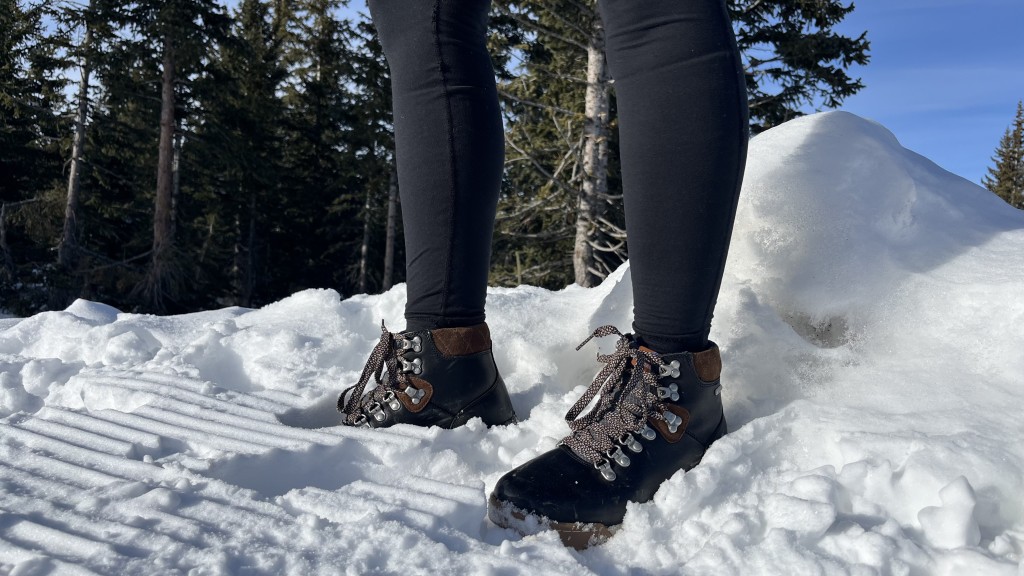
The Forsake Patch do well in mild winter conditions and packed snow.
Credit: Briana Valorosi
The UGG Adirondack III is another all-around excellent winter boot made entirely from leather and rubber and offers amazing protection from both water and snow. It protects the feet from up to 9 inches of snow and checks all the boxes regarding weatherproofing, comfort, and traction. If your winters are cold and wet, we highly recommend the nylon-based Columbia Minx Shorty III or the Kamik Momentum 3. Each boot has a low to mid-calf collar height with a high-performance DWR finish to wick away snow and water. They also have reliable tread that allows each boot to take on a variety of terrain and snow conditions.
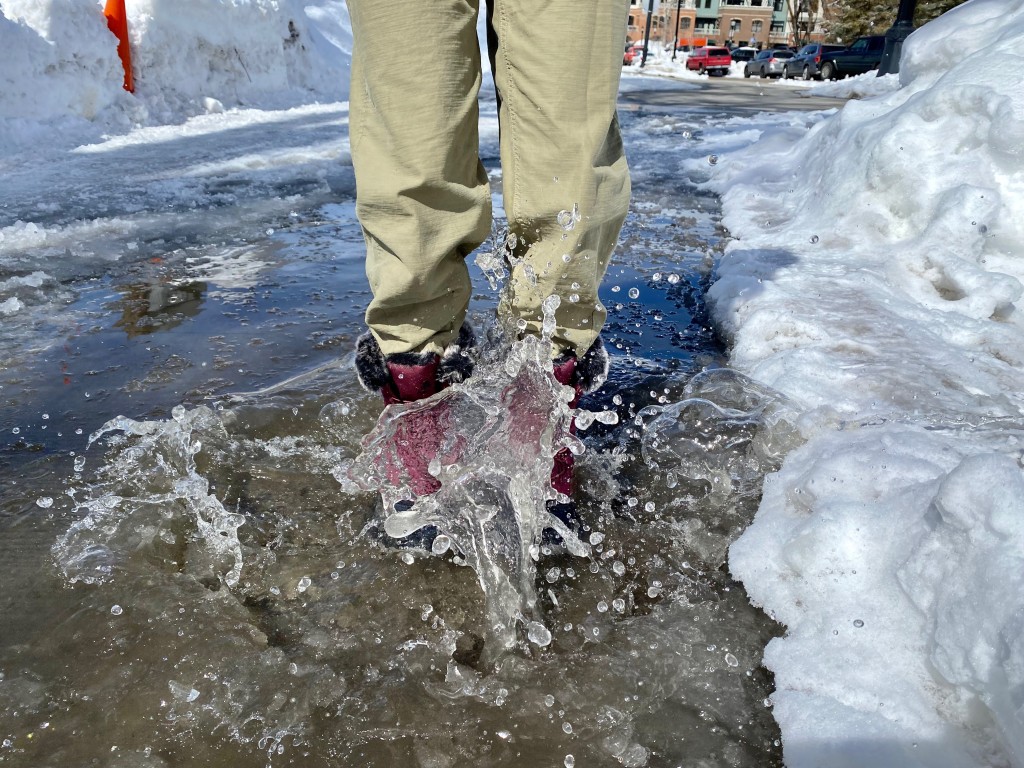
The high thread count denier nylon on the Kamik Momentum 3 delivers on its promises of waterproofness. While the fur will get wet when doused with water, the upper stays dry.
Credit: Keeghan Sebahar
Not everyone wants half of their calves wrapped in a burly winter boot every time it snows. If you’re looking for a casual-looking skate-style model, the Vans Standard Mid Snow MTE kept our feet perfectly dry and warm in near-freezing water at a depth of five inches. These boots might not be cut out for full-blown blizzards, but they’re more than sufficient for smaller snowstorms, and won’t leave you looking like you’re dressed for an Arctic expedition when the snow has melted by the end of your workday.
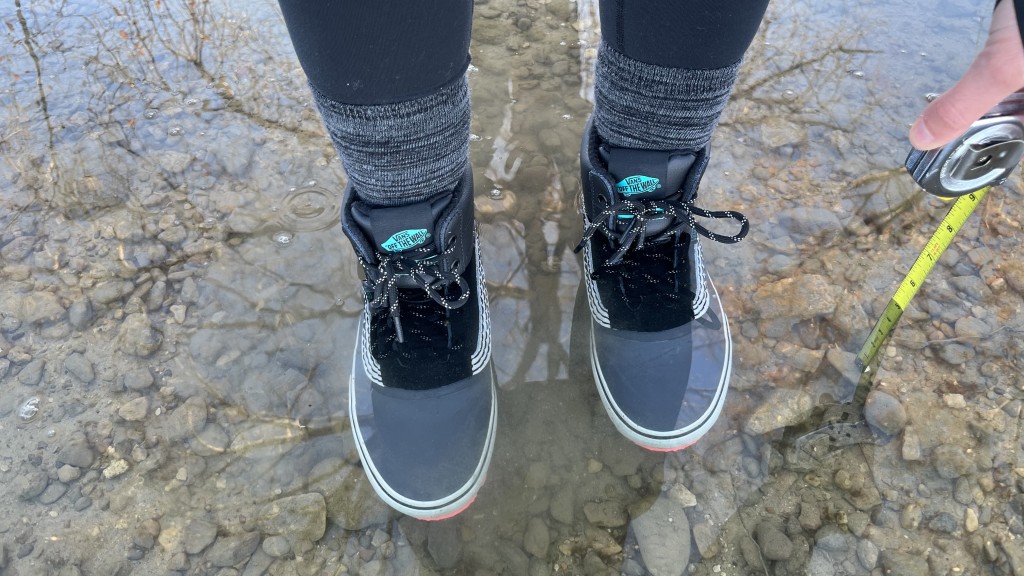
At a depth of 5″, water stayed out and our feet remained dry.
Credit: Briana Valorosi
Comfort and Fit
Those who live and play in the burliest winter conditions know that warmth and comfort are of the utmost importance for winter wear. For those who spend their winters shoveling or working in wet, snowy, muddy conditions, comfort and fit are top priorities.
While we believe comfort and fit go hand in hand, they aren’t synonymous. We examined each boot’s liner, footbed, flexibility, and weight to evaluate comfort and judge how cozy the interior materials are to wear all day. We made a side-by-side comparison to assess the toe box’s size, shape, width, and heel pocket to judge fit. We took notes as we felt out which boots were “true to size” and which boots sat bigger or smaller on the sizing spectrum. Lastly, we considered the stability and support of each boot to offer insights into which boot would be best worn under certain circumstances (i.e., work, fashion, outdoor activities, etc.).
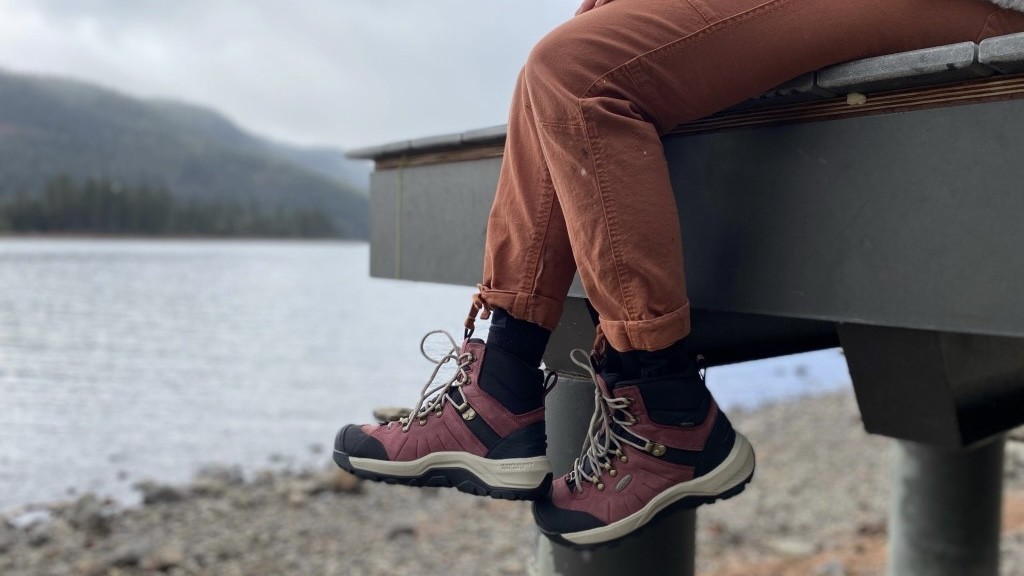
The Keen Revel boots are comfortable enough for winter hiking and everyday activities.
Credit: Liz Chamberlain
The most comfortable options were light, flexible, and soft with a sturdy, protective fit. Those with plush liners, solid insulation, and cushy footbeds also rose above in this metric. Overall, if you’re seeking the perfect balance between fit and comfort, The North Face Shellista IV Mid and UGG Adirondack III are two of your best bets. The next-to-skin fit and curved footbeds provide a better sense of support, stability, and movement. These designs use textiles and top-grain leathers that offer an ideal balance between stiffness and flexibility to help facilitate both comfort and stability. The Baffin Escalate offers up lightweight flexibility that feels like a tall winter slipper, supported by a soft fleece lining. While it’s not the best for stability and support, it nails the comfort category.

We liked the Baffin Escalate for slipping into before and after a day at the ski resort.
Credit: Guy Eriksen
The Danner Inquire Mid is a modest and versatile option that offers a comfortable and snug fit right out of the box. The Inquire Mid could serve as an everyday work shoe or a simplistic low-top hiking boot. While it provides less coverage and traction than other models, it is a stand-out in all-around style, comfort, and fit. The UGG Adirondack III is built with super soft wool insulation in the liner and is also incredibly comfortable. However, while the wool is super soft and plush, the footbed doesn’t offer as much support as the Inquire Mid.
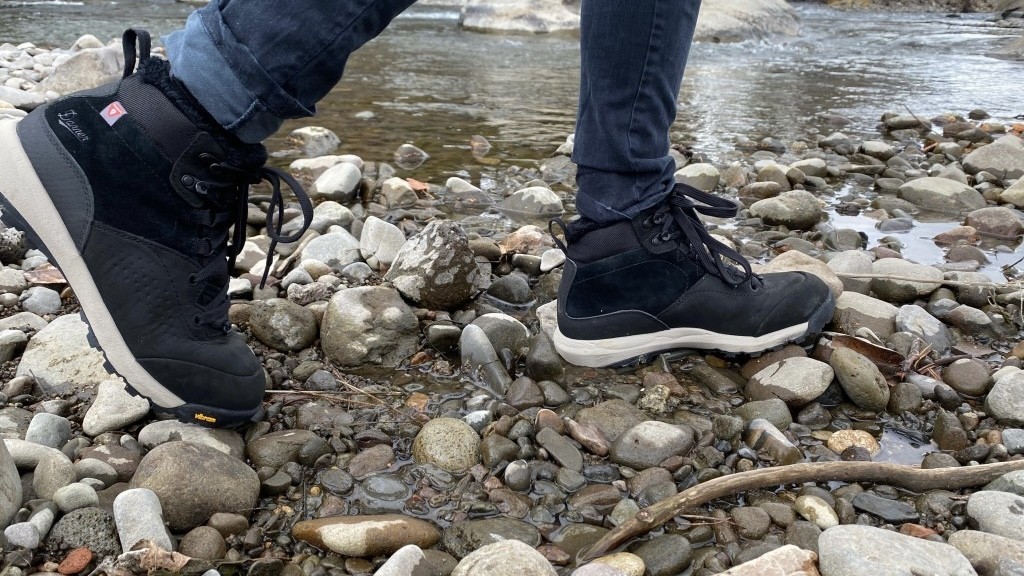
The Danner Inquire is a great stylish winter boot for the city or getting slightly off the beaten path.
Credit: Liz Chamberlain
For those that are shopping for a more casual-looking winter boot that holds its own in nasty conditions, we were pleasantly surprised with the overall performance of the Forsake Patch Mid – especially in terms of comfort. The soft leather uppers of this boot allow for a full range of motion that flexes exceptionally well with each step.
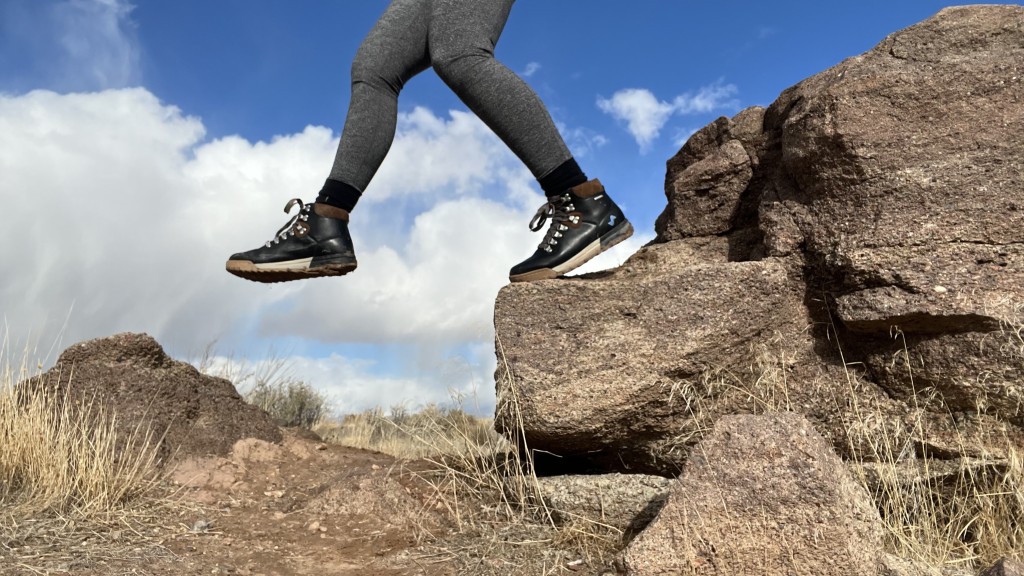
The Patch Mid boots were comfortable for winter hiking in freezing temps.
Credit: Briana Valorosi
Weight was also a bigger factor than we anticipated in our testing process. Some boots weigh significantly more than others, which became evident when hiking or wearing boots during 8-hour work shifts. Some had bulkier builds with a far better warmth-to-weight ratio, like the Shellista IV Mid. The heavier boots tended to provide greater traction, while the lighter boots were generally not quite as warm and did not perform as well in snowy conditions.
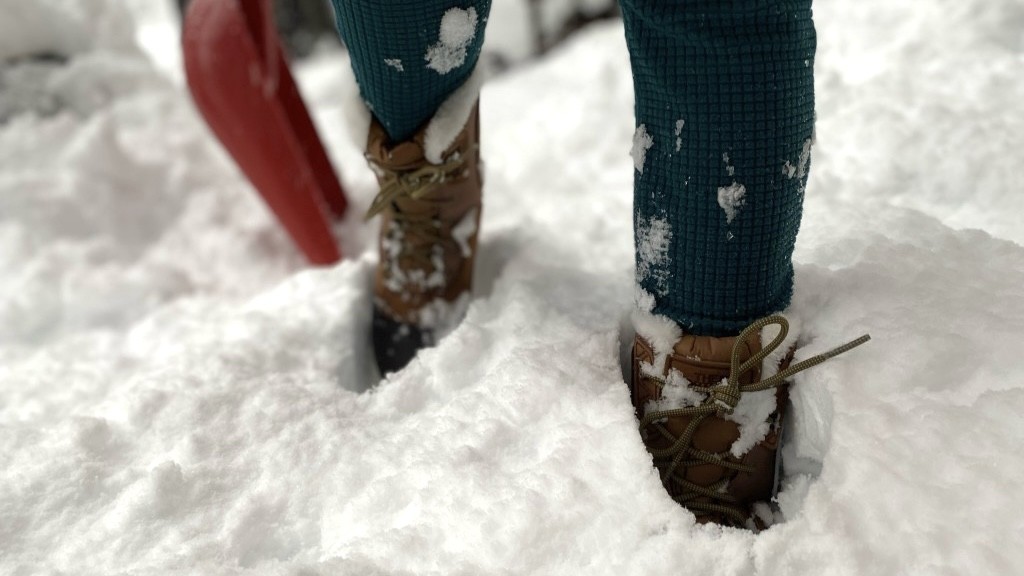
The Shellista IV Mid kept everything from the lower calf to the foot roasty toasty on early morning shoveling missions.
Credit: Liz Chamberlain
Regarding weight, the Baffin Escalate, Columbia Minx Shorty III, and Salomon X Ultra 4 Mid Winter stood out as the lightest boots in our lineup, all of which weigh well under 1.5 lbs for a pair. This can be an important aspect of comfort if you work on your feet for many hours at a time, if you travel, or if you plan to hike great lengths.
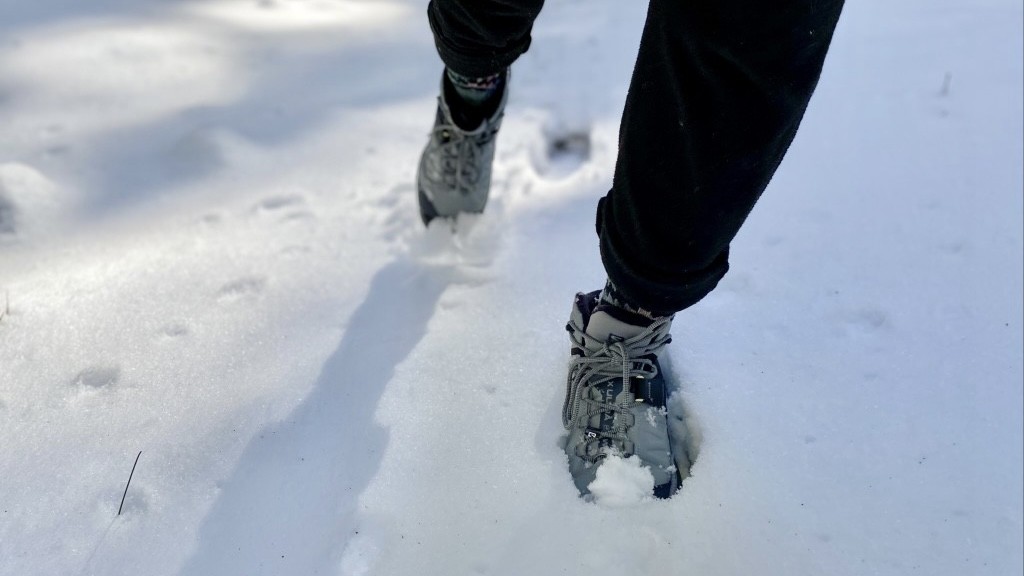
Lightweight and flexible, the X Ultra 4 Mid Winter was a comfortable boot for hikes, trail runs, everyday errands, or a day at work.
Credit: Liz Chamberlain
Traction
A bomber outsole is key to staying on your feet through winter. The last thing you want is to slip on ice or down a slope, so we tested each boot for its ability to keep you on your feet through inclement weather. We studied each model’s outsole by measuring the depth of the lugs and assessing the tread pattern. We skated around on ice patches, hiked on trails near town, and got out on the hills of our favorite ski resorts. We even used a natural ice ramp at the end of our neighborhood cul-de-sac to test traction going uphill and downhill. In the end, we learned that those with the largest lugs and surface area did best on technical terrain and inclines, while flatter soles and wave patterns work best on pavement or in wet conditions (rain or puddles).
Rubber compounds are a huge part of the traction and functionality equation. Over centuries, engineers have fine-tuned rubber compounds to optimize grip, durability, and performance at different temperatures. Like most of the earth’s compounds, rubber acts differently under varying temperatures and climates. While Vibram’s Arctic Grip may be great in sub-zero temperatures, it may not act the same in milder spring temperatures. We did our best to test each boot and determine its best arena for use.
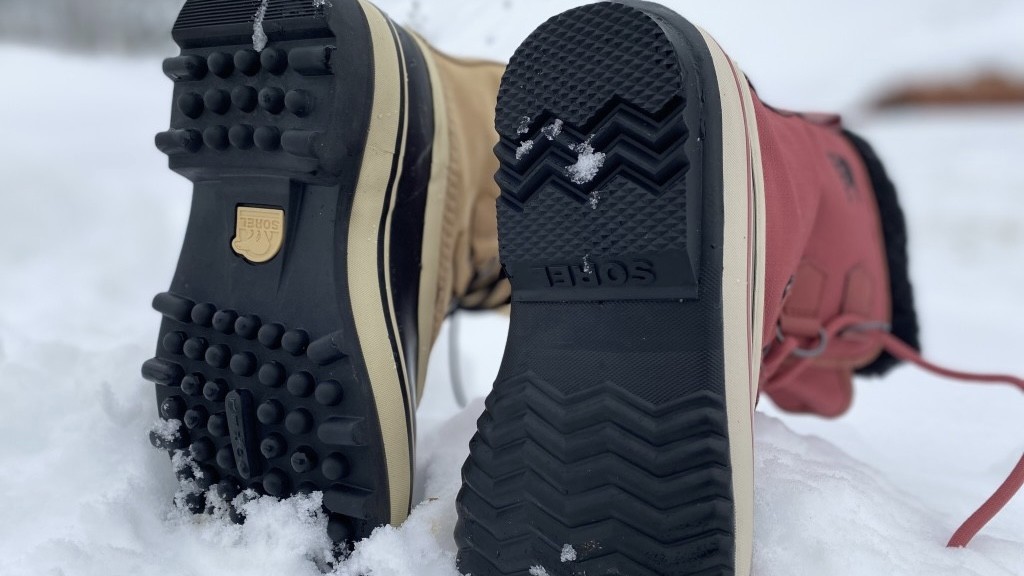
Above are the two different sole patterns we saw in the winter boots. About 50% had external lugs while the other 50% had some type of wave pattern.
Credit: Liz Chamberlain
While all the boots tested provide a level of traction, some are better than others. If you plan on being out in deep snow throughout the winter, a sole with a lot of surface area is your best option, like the Sorel Caribou or Muck Boot Arctic Ice Tall. The rubber compound on the Arctic Ice is stiffer, while the Caribou is more soft and supple. This means the Arctic Ice is less reliable on icy inclines, while the Caribou is better at grasping that kind of terrain because the lugs can better stick to the ground. The Baffin Chloe has a sort of blended lug pattern that feels grippy to the touch and performs well across all types of terrain.

A look at the Chloe’s lugs. This boot offers great winter traction.
Credit: Liz Chamberlain
For hiking-focused boots, the Keen Revel IV Polar and Salomon X Ultra 4 Mid TS CSWP have exceptional traction on snow. They also have a nice snug fit around the heel pocket, which is key to avoiding blisters and keeping a firm grip. If you plan to get on steep trails this winter, we highly recommend either of these boots. A hiking boot design will have great traction, weatherproofing, and durability for active winter use.
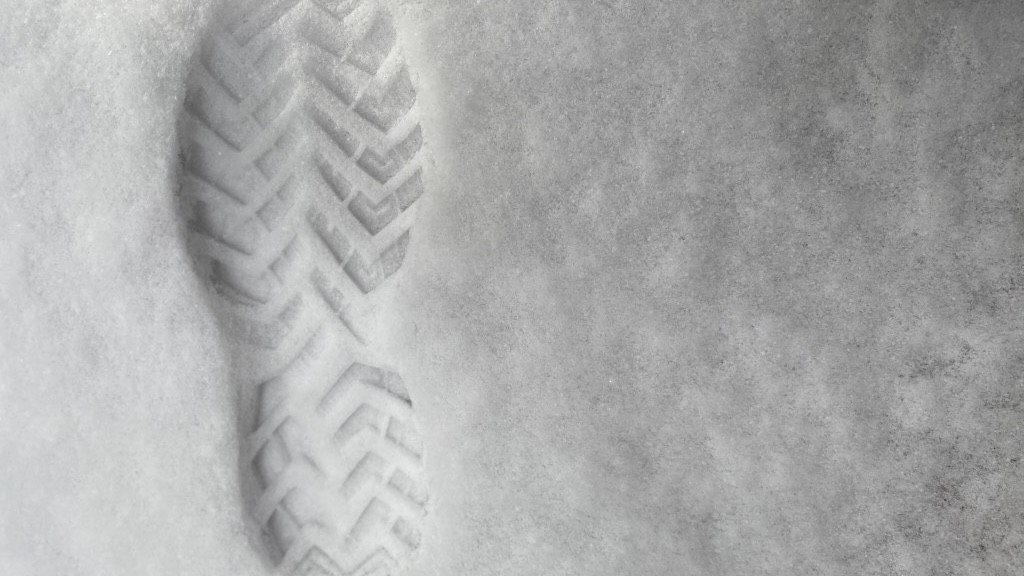
Merrell’s Thermo Chill boot offered some of the best traction in our test.
Credit: Liz Chamberlain
The Sorel Caribou and Muck Boot Arctic Ice Tall have some of the deepest lugs in the group. The UGG Adirondack II and Danner Inquire Mid have shallower lugs, but they provide great traction on snowy hikes.
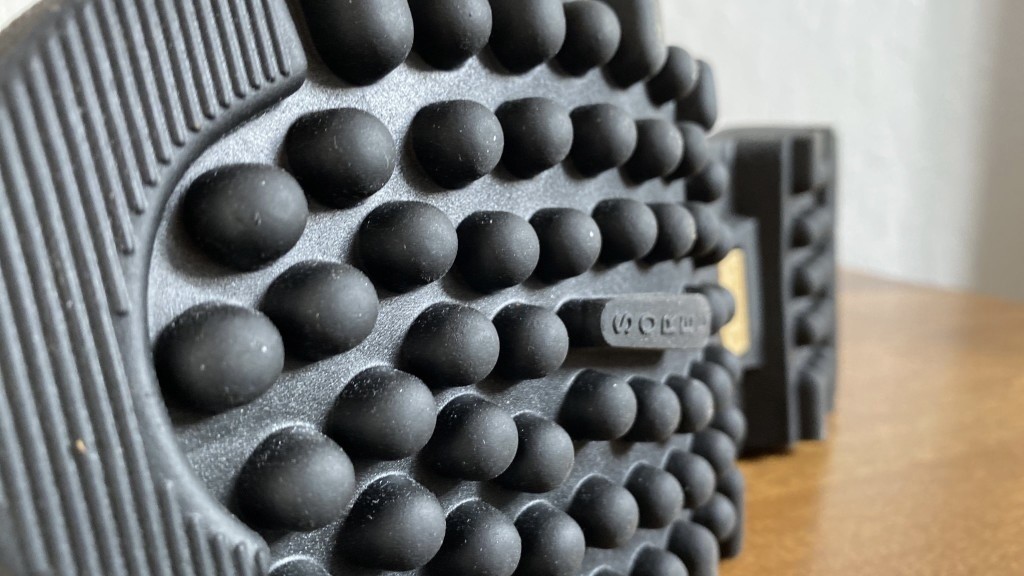
The unique 1/2 inch rounded lugs on the Caribou outsole are enhanced by thicker lugs around the edges to maintain grip on uneven surfaces.
Credit: Liz Chamberlain
The wavy sole patterns on the Sorel Winter Carnival and Blundstone Thermal proved to have unreliable traction on uneven snowy surfaces but maintained a solid grip for everyday errands and activities. These would be best for warm indoor workwear, casual streetwear, and everyday winter comfort.
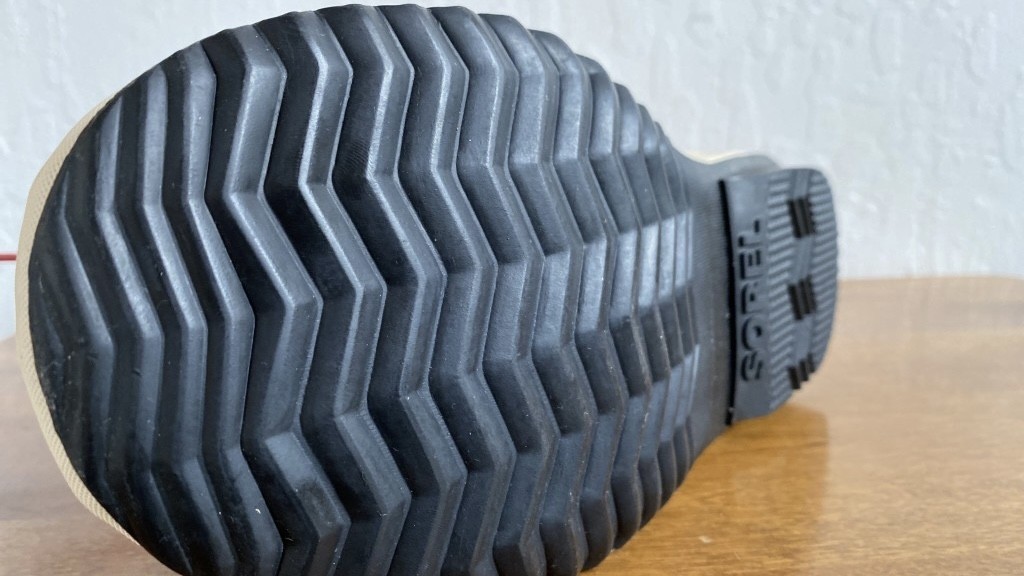
The wave pattern was not exactly confidence inspiring in deep or uneven snow trenches. We felt a little uneasy when going up and down slope.
Credit: Liz Chamberlain
A Note on Winter Hiking Boots
The fit of an active winter hiking boot is important for those who want to take on the winter’s iciest trails. Hiking boots often have a more snug and shapely design with a low collar to offer stability and security with a comfortable range of motion. Everything from the outsole to the laces is chosen and constructed with active use on varying terrain in mind.
We test our boots for traction, comfort, and overall function on as many inclined surfaces as possible. We take on snow-laden trails, icy staircases, and backyard pillow lines.
Credit: Cory Caldwell
Our testers with wide or high-volume feet, or those looking for more wiggle room, opted for the Keen Revel IV Polar, which has more space in the forefoot and below the arch. If you’re looking for the best arch support, the Salomon X-Ultra 4 Mid Winter has you covered. We also suggest the Mid Winter for folks with narrow feet. Each one of these options offered excellent traction on inclines, with slightly different levels of ankle coverage depending on the shaft height. If you opt for a comfort-focused snow boot with good traction, you may find that the fit around the foot is a bit wider or looser, which can cause discomfort over 5+ miles of hiking.
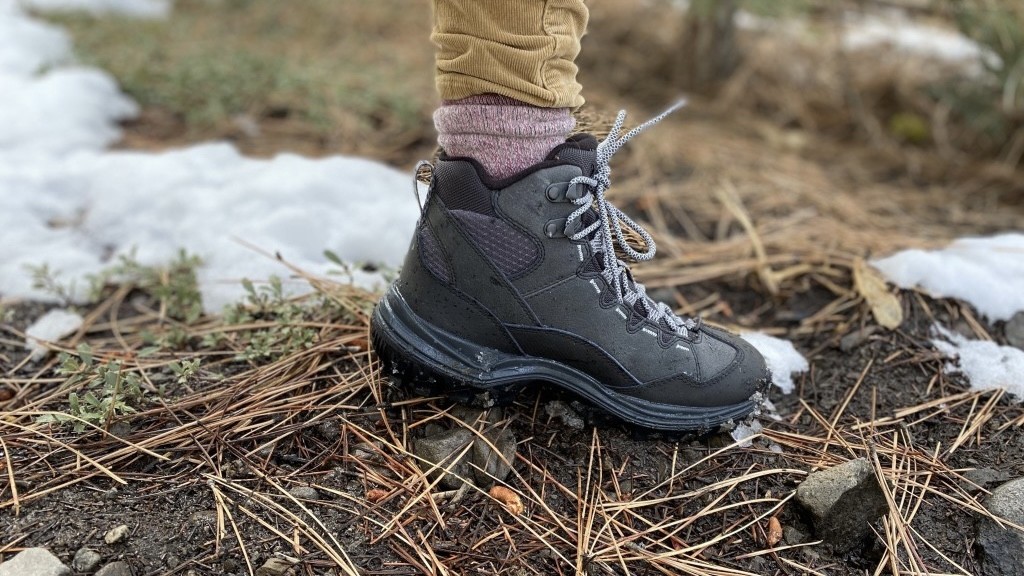
The lugs of the Merrell weren’t quite as thick as the Keen Revel IV, which helped the outsole to shed sticky mud.
Credit: Liz Chamberlain
Durability
Long-time winter veterans know the value of a boot that lasts many seasons without replacement. When we assess durability, we look at the quality of materials used and how the boot is constructed and then analyze how those materials hold up under light, medium, and heavy use in winter conditions.
Neoprene, leather, suede, nylon, and mesh are the most frequently used textiles in this footwear category, and each excels in different environments. For example, rubber and neoprene can withstand extended exposure to wet conditions, while suede and leather will wear down more quickly in wet environments.
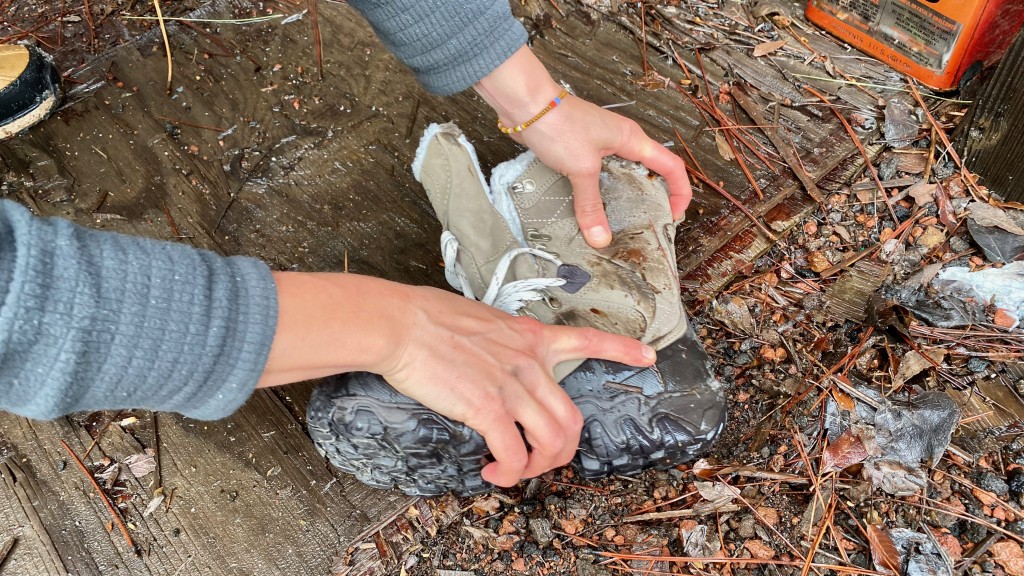
We scrape up the boots against hard ground surfaces to test the outsole and the upper for abrasion resistance.
Credit: Cory Caldwell
To test durability, we left our test boots out in the snow for multiple hours at a time, soaked them in the local river, and soaked them in ice baths. We used before and after photo evidence to capture fading, curling of the tongue or upper collar, and ripping or fraying of laces and seams, though most boots held up quite well for months of wear and tear. We tested outsole durability by actively rubbing and scrubbing boot soles on the pavement. We checked for evidence of rounding of the lugs and scuffing of the outer edge of the sole. To make the durability testing more systematic, we also smashed the boots against rocks, trees, ice, and pavement to really challenge the integrity of the exterior.
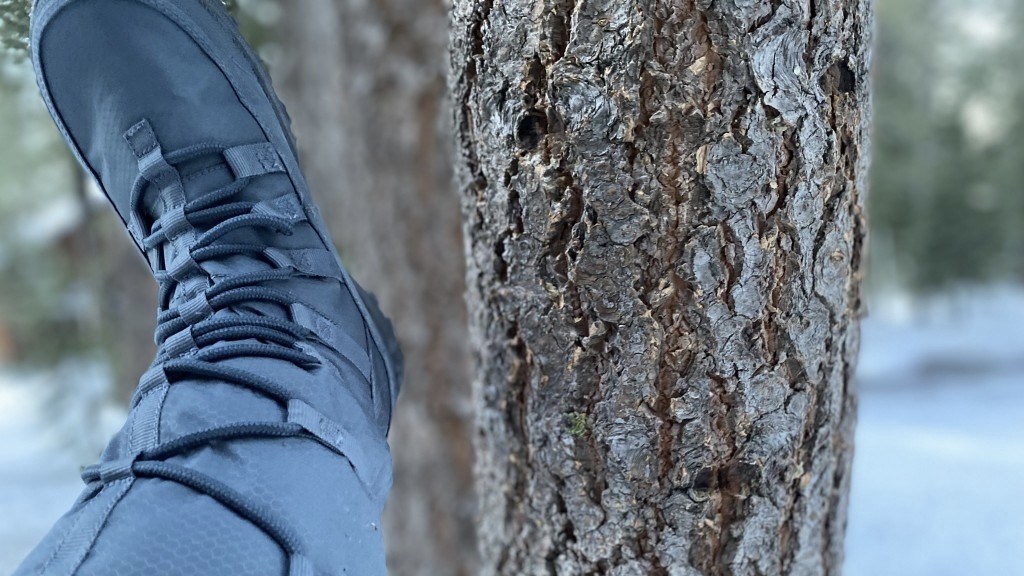
We smashed our boots against bark to test how well the boots could handle extensive, rough use out in the elements.
Credit: Liz Chamberlain
Leather and suede are two of the most frequently used winter boot materials that are known to have the longest lifespans if cared for properly. These textiles require care and maintenance throughout the season as they are particularly prone to scuffing, weathering, and fading. Hence, cleaning and conditioning treatments are a great way to keep your boots looking fresh. Waterproofing treatments are also a great idea if you plan to use your leather boots as everyday winter wear for multiple seasons. Brands like Blundstone and Danner sell their own waterproofing treatments; otherwise, you can find a variety of treatments through aftermarket brands like Nikwax.
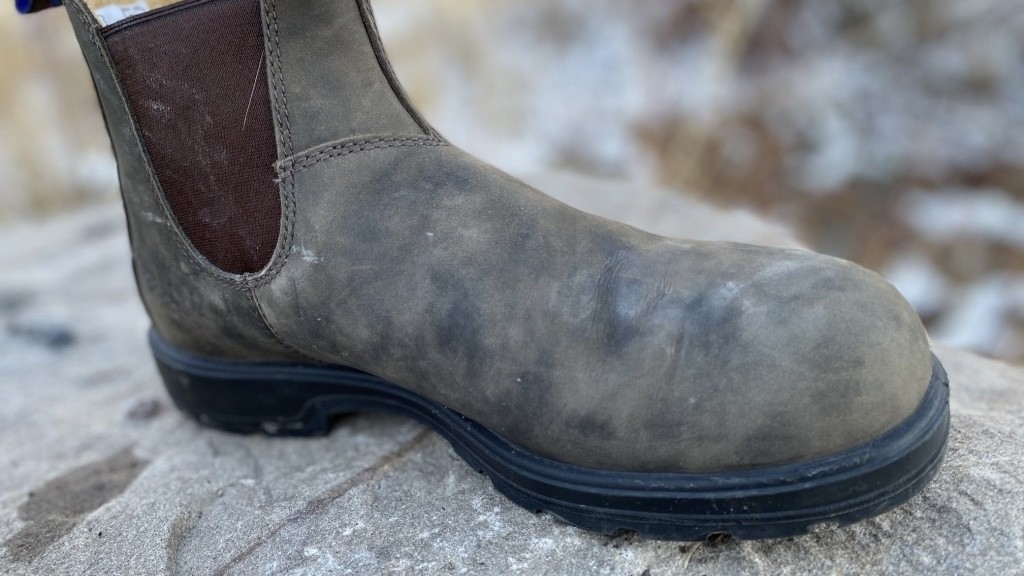
Leather and suede are known for their longevity and durability in footwear. This is why Blundstone and Danner have long been trusted brands in the winter and work boot categories.
Credit: Amber King
We evaluated the strength and buoyancy of laces and eyelets to determine if they could undergo long-term use in heavy snow conditions. We rubbed up on trees and rocks to see how scuffed a boot’s outsole and upper could get. We also assessed each boot’s durability based on the stiffness of the shaft. Most boots have thick stitching that runs from the heel to the boot’s collar, often with a stitched-in loop to help pull the boot on. The stiffer the shaft, the more likely the boot will maintain structure over time.
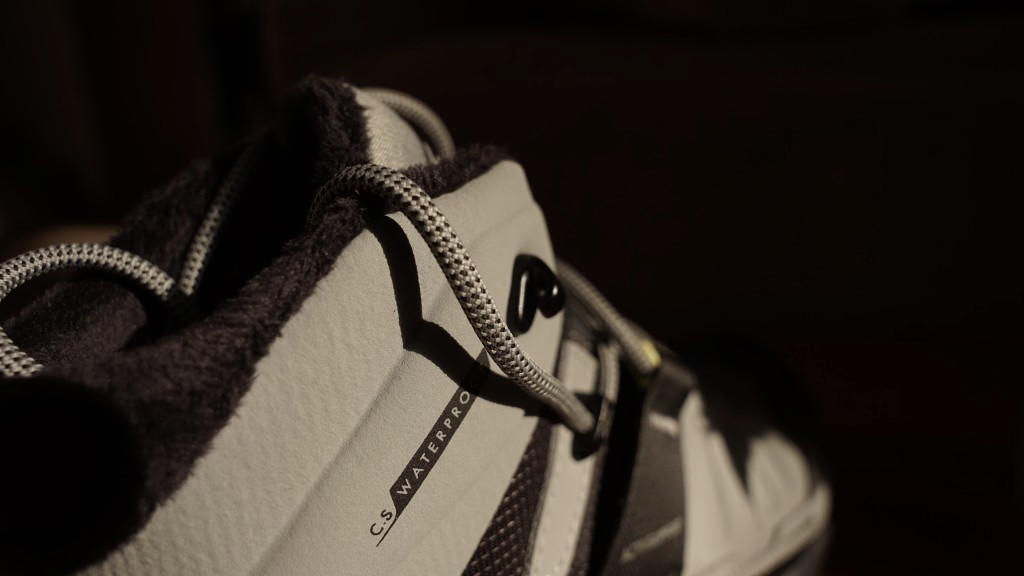
Sturdy, hooked eyelets with stretchy laces create a guaranteed tight fit around the arches and ankles, seen here on the Salomon X Ultra 4 Mid Winter.
Credit: Liz Chamberlain
Of the test group, we found the Muck Boot Arctic Ice Tall and Baffin Chloe to be the top-performing boots in terms of durability. The strength of these boots is predominantly characterized by tough rubber outsoles and thick uppers that provide insulation and great protection from the elements. We took these boots on walks over long rocky beaches and through riverbeds and kept them on for fall wood-splitting sessions. These boots barely showed any wear, even after months of testing.
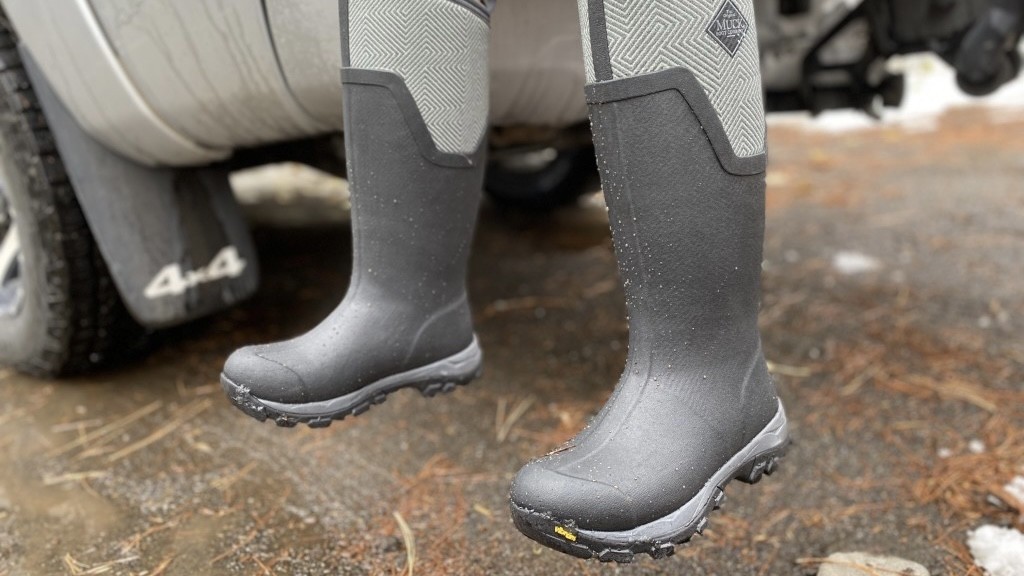
The Muck Boot Arctic Tall is one of the most indestructible boot we tested, with 6mm of practically impenetrable neoprene.
Credit: Liz Chamberlain
Conclusion
A high-performing winter boot can keep you warm and protected from whatever the seasons may bring. Be sure the boot you settle on is warm, breathable, and offers decent traction and weather protection to get you through the burliest days of winter. While there are many choices on the market, we chose the top players from some of the most renowned brands in the footwear industry. We’ve assessed the industry’s tried and true models and determined the value of each design in our lineup. We’ve done the hard work, so you don’t have to. Enjoy!


:max_bytes(150000):strip_icc()/tl-comfy-clothes-for-travel-tout-top-picks-badge-747a0b1035c7426388bbba64fa131610.jpg)

:max_bytes(150000):strip_icc()/tal-product-outdoor-research-womens-aspire-super-stretch-jacket-jthompson-0540-1-ebce0c898f874cabb7a6d9b7ef47ea5d.jpeg)


